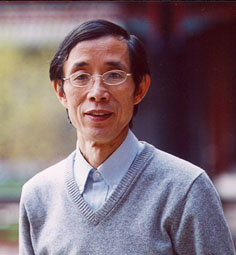-
首页
-
- 首页
- 观点
陈平教授个人简历
发布日期:2009-05-30 20:31 来源:北京大学国家发展研究院

陈平 博士
现任职务
复旦大学 新政治经济学中心 高级研究员,学术委员会主任, 复旦大学 经济学院 兼职教授
北京大学 国家发展研究院/中国经济研究中心 教授,博士生导师(2013年退休)
春秋综合研究院 研究员
北京大学 经济学院 兼职教授
美国 哥伦比亚大学 资本主义与社会研究中心 外籍研究员
美国 德克萨斯大学 奥斯汀校区 量子复杂系统中心 访问科学家
研究领域
复杂经济学,演化与创新经济学,宏观经济学,金融经济学,制度经济学,政治经济学,转型经济学,文化人类学,经济史,文明史,科学学,方法论等。
学历
1962年毕业于 上海格致中学 五年制试验班;
1968年毕业于北京 中国科学技术大学物理系;
1987年获德克萨斯大学奥斯汀校区 物理学博士。GPA:4.0(总平均成绩为满分);
博士论文:“非线性动力学与经济周期理论”。
导师:普里戈金 (Ilya Prigogine) 教授,1977年诺贝尔化学奖获得者,非平衡态统计物理与耗散结构理论奠基人。跨学科的指导委员会包扩宇宙大爆炸模型和交通流科学的先驱者赫曼(Robert Herman)和两名经济学家:提出经济成长阶段论的罗斯托(Walt Rostow)和 Divisia 货币指数的创始人巴奈特(William Barnett)。
经历
1968年至1974年,任成都铁路分局电工。业余研究理论物理,科学技术史,和经济史;
1974年至1979年,任中国科学院合肥等离字体物理研究所实习研究员,研究受控热核反应。
1978年,被借调筹备全国科学大会工作,参与科技教育体制改革的政策研究;
1979年至1980年,合肥中国科学技术大学近代物理系研究生,参与农业政策改革和人才学的研究,被聘为安徽省政协特邀委员;
1980年秋至1981年夏,美国休斯顿大学物理系研究生;
1981年秋-1987年夏,师从德克萨斯大学普里戈金教授,研究非平衡物理学、非线性演化动力学、与复杂系统科学;1985年首先发现经济混沌的经验证据;1987年夏获物理学博士学位;答辩后受研究生院院长亲笔信嘉奖。高度评价研究成果。
1988秋至2002年春,先后在美国德克萨斯大学奥斯汀校区 普里戈金统计力学与复杂系统研究中心任博士后研究员、研究员、和研究科学家;
1988年至1989年,任中国留美经济学会第三届会长;
1988年至1994年,任北京大学 管理科学研究所副教授;
1997年至2013年,任北京大学 中国经济研究中心(后改名国家发展研究院)教授,博士生导师,2013年3月退休;曾任中国经济研究中心主管科研的副主任;
2003年至今,美国德克萨斯大学奥斯汀校区 复杂量子系统中心访问科学家;
2004年至今,任复旦大学新政治经济学研究中心高级研究员,学术委员会主任;
2010年至今,被邀为美国纽约 哥伦比亚大学 资本主义与社会研究中心 外籍研究员;
2011年5月至今,被邀担任世界经济学会 (World Economics Association) 创始执委会委员,和世界经济评论 (World Economic Review) 的编委。
2011年至今,社会经济学论坛 (Forum for Social Economics) 编委
2012年至今,任上海 春秋综合研究院 兼职研究员;
2012年至今,任北京大学 经济学院 兼职教授;
其他兼职包括:浙江杭州阿里巴巴商学院兼职教授;南开大学经济史研究所兼职教授;曾先后被聘为上海市政府、社会劳动保障部、国家开发银行、安徽凤阳县政府等的专家顾问。
中文论文集
陈平,《文明分岔、经济混沌、和演化经济动力学》,北京大学出版社,北京2004年出版。
陈平,《文明分岔、经济混沌、和演化经济学》,经济科学出版社,北京2000年出版。
陈平,《陈平集-封闭,冲击,演化》,黑龙江教育出版社,哈尔滨1988年版。
英文论文集
Chen, Ping. Economic Complexity and Equilibrium Illusion: Essays on Market Instability and Macro Vitality, London: Routledge (2010).
Day,Richard and Ping Chen,Nonlinear Dynamics and Evolutionary Economics, Oxford University Press, Oxford (1993)。
Chen, Ping. Nonlinear Dynamics and Business Cycles,Ph.D. Dissertation, University of Texas at Austin,May 1987。
中文学术论文
陈平,“中国道路的本质和中国未来的选择”,《经济社会体制比较》,2012年第3期,1-23页。
陈平,“中国道路的争议和新古典经济学的迷思”,《政治经济学评论》,2012年,第3卷,第2期,39-75页。
陈平,“走出凯恩斯-弗里德曼的流动性陷阱:后金融危机时代的宏观演化经济学“,《演化与创新经济学评论》,2012年第1辑,45-53页。
陈平,“土地流转,城市模式,与农民转业”,《人民论坛-学术前沿》,总第336期,2011年8月15日,12-15页。
陈平,“均衡幻象,经济复杂和经济分析的演化基础”,《演化与创新经济学评论》,2011年第1辑, 42-77页。
陈平,“从‘民富国强’与‘国泰民安’的两条道路之争谈起“,《红旗文稿》2010年第23期,第8-11页
陈平,“中国之谜与中国之道 “,《红旗文稿》2010年第4期。该文2010年3月获《人民网》“中国道路探索”征文一等奖。
陈平,“论保罗-萨缪尔逊对数理经济学和经济学变革的贡献,纪念经济科学家保罗-萨缪尔逊”,《经济学动态》,2010年第2期,46-52页。
唐毅南、陈平,“群体动力学与金融危机的预测”《经济研究》2010年,第6期,53-65页。
唐毅南、陈平,“趋势与波动相关下的期权定价模型”,《金融评论》,2012年,第2期,1-11页。
唐毅南、陈平,“S形需求曲线的动态起源:消费者社会相互作用下时尚商品的群体模型”,《经济学(季刊)》,第8卷,第3期,1013-1028页,2009年4月。
李华俊、陈平,”风险发展环境下的困境、对策比较:安徽和广西农村个案”,《改革》2008年第10期,95-101页。
曾伟,陈平,“波动率微笑、相对偏差和交易策略——基于非线性生灭过程的股票价格一般扩散模型”,《经济学(季刊)》, 第7卷,第4期,2008年7月,1415-1436页.
陈平,“从生物复杂性到经济复杂性”,秦银河 、 文德功、 陈晓红主编,解放军总医院《医学人文讲坛》,68——120页,清华大学出版社,2008年1月。
陈平,私有制的神话和多种所有制的现实 ——德国蔡司光学仪器公司、美国大学联邦信用社和MIT学生之家的经验及启示,史正富和刘昶编,《民营化还是社会化:国企产权改革的战略选择》,世纪出版集团, 2007年3月出版。
陈平,新古典经济学在中国转型实验中的作用有限,《经济研究》,2006年10月。
陈平,从华盛顿共识失败看经济学变革方向,《红旗文稿》,2005年第11期,13-15页,2005年6月10日。
陈平,纪念演化物理学家普里高津,《科学文化评论》,第1卷,第5期,30-35页,2004年10月出版。
陈平,从李约瑟问题看中西科技体制和学风的差距,《科学对社会的影响》,2002年第2期,49-57页,2002年6月25日出版。
陈平,建立中国统一的社会保障体系是自损国际竞争力的短视国策,《中国改革》,2002年第4期。陈平,劳动分工的起源和制约-从斯密困境到广义斯密原理, 《经济学(季刊)》, 第1卷,第2期(2002年1月).
丁琳, 陈平, ”银行垄断、信用危机和金融改革”,改革,2000年第2期。
丁琳,陈平,“一个中国各地区经济增长的实证研究,”经济科学,1998年第4期,46-54页。
陈平,单一小农经济结构是我国长期动乱贫穷、闭关自守的病根, 《人民日报》与《光明日报》1979年11月16日。
陈平,历史上的科学人才-科学家成长因数的调查报告, 《人民教育》1979年第四期。
英文学术论文
Chen, Ping. “Metabolic Growth Theory: the Rise and Fall of Civilizations in Learning Competition,” Journal of Evolutionary Economics (May 2013 accepted), based on the invited speech at 14th ISS (International Joseph A. Schumpeter Society) Conference at Brisbane, Australia, July 2, 2012.
Tang, Yinan, Wolfram Elsner, Torsen Heinrich, and Ping Chen, “Trend, Randomness, and Noise: Exogenous vs. Endogenous Explanation in Complex Heterodox Analysis (A Note on Nicolas Bouleau in RWER 60)”, Real World Economics Review, no.62 (2012).
Chen, Ping. “China Approach in a Changing World,” Invited Keynote speech at 6º. FORUM DE ECONOMIA DA FUNDAÇÃO GETÚLIO VARGAS, Sao Paolo, Brazil, Sept.22, 2009. In Bresser-Pereira, Luiz Carlos, ed. Depois da Crise. A China no centro do mundo? (After the Crisis, China in the Center of the World?), Rio de Janeiro: Editora FGV (2011).
Chen, Ping. “From an Efficient to a Viable International Financial Market,” in R. Garnaut, L. Song and W.T.Woo eds. China’s New Place in a World in Crisis: Economic, Geopolitical and the Environmental Dimensions, Chapter 3, pp.33-57, Australian National University E-Press and The Brookings Institution Press, Canberra (2009).
Chen, Ping. “Three Dimensions of Current Economic Crisis,” in Looking for Solutions to the Crisis: The United States and the New International Financial System, Conference Proceedings, New York, Nov. 14, 2008, EPS (Economists for Peace and Security) and IRE (International Initiative for Rethinking the Economy), Published in Clamecy, France (2009)
Chen, Ping. “Equilibrium Illusion, Economic Complexity, and Evolutionary Foundation of Economic Analysis,” Evolutionary and Institutional Economics Review, 5(1), 81-127 (2008).
Chen, Ping. “Complexity of Transaction Costs and Evolution of Corporate Governance,” Kyoto Economic Review, 76(2), 139-153 (2008).
Chen, Ping. “Market Instability and Economic Complexity: Theoretical Lessons from Transition Experiments,” in Yang Yao and Linda Yueh eds., Globalization and Economic Growth in China, Chapter 3, pp.35-58, World Scientific, Singapore (2006).
Chen, Ping. “Evolutionary Economic Dynamics: Persistent Business Cycles, Disruptive Technology, and the Trade-Off between Stability and Complexity,” in Kurt Dopfer ed., The Evolutionary Foundations of Economics, Chapter 15, pp.472-505, Cambridge University Press, Cambridge (2005).
Chen, Ping. “Microfoundations of Macroeconomic Fluctuations and the Laws of Probability Theory: the Principle of Large Numbers vs. Rational Expectations Arbitrage,” Journal of Economic Behavior & Organization, 49, 327-344 (2002).
Chen, Ping. “A Random Walk or Color Chaos on the Stock Market? - Time-Frequency Analysis of S&P Indexes,” Studies in Nonlinear Dynamics & Econometrics , 1(2), 87-103 (1996).
Chen, Ping. “Trends, Shocks, Persistent Cycles in Evolving Economy: Business Cycle Measurement in Time-Frequency Representation,” in W. A. Barnett, A. P. Kirman, and M. Salmon eds., Nonlinear Dynamics and Economics, Chapter 13, pp. 307-331, Cambridge University Press (1996).
Chen, Ping. “China's Challenge to Economic Orthodoxy: Asian Reform as an Evolutionary, Self-Organizing Process,” China Economic Review, 4, 137-142 (1993).
Chen, Ping. “Imitation, Learning, and Communication: Central or Polarized Patterns in Collective Actions,” in A. Babloyantz ed., Self-Organization, Emerging Properties and Learning, pp. 279-286, Plenum, New York (1991).
Chen, Ping. “Needham's Question and China's Evolution - Cases of Nonequilibrium Social Transition,” George Scott ed., Time Rhythms and Chaos in the New Dialogue with Nature, Chapter 11, pp.177-198, University of South Dakota at Vermillion, Iowa State University Press (1990).
Chen, Ping. “The Aggregation-Theoretic Monetary Aggregates are Chaotic and Have Strange Attractors: An Econometric Application of Mathematical Chaos” (co-authored with William A. Barnett), in Dynamic Economic Modeling, W. A. Barnett, E. Berndt, and H. White eds., Chapter 11, pp.199-245, Cambridge University Press, Cambridge (1988 ).
Chen, Ping. “Empirical and Theoretical Evidence of Economic Chaos,” System Dynamics Review, Vol. 4, No. 1-2, 81-108 (1988).
个人网页
复旦大学新政治经济学中心:http://www.cnpe-fudan.org/
观察者陈平专栏:www.guancha.cn/chen-ping/list_1.shtml
新浪微博:http://weibo.com/ChenPingPKU
新浪陈平博客:http://blog.sina.com.cn/u/1726901934
搜狐陈平博客:http://chenping.blog.sohu.com
搜狐陈平专栏:http://business.sohu.com/chenping.shtml
Ping Chen’s English website at Complex_Economics: http://www.complexeconomics.org/
Ping Chen’s link at CSC of Columbia University: http://capitalism.columbia.edu/view/people/foreign-member
电子邮箱
pchen@ccer.pku.edu.cn
国家发展研究院官方微信
Copyright© 1994-2012 北京大学 国家发展研究院 版权所有, 京ICP备05065075号-1
保留所有权利,不经允许请勿挪用


